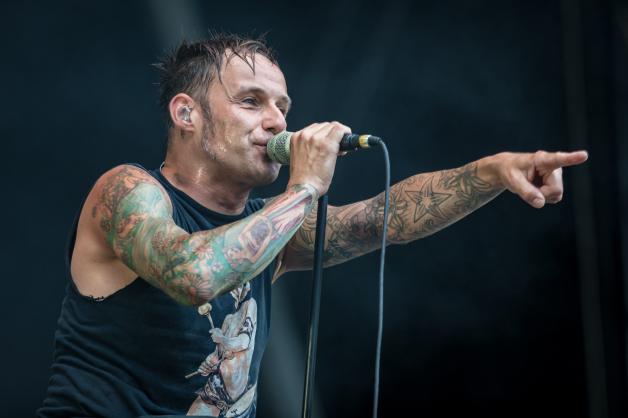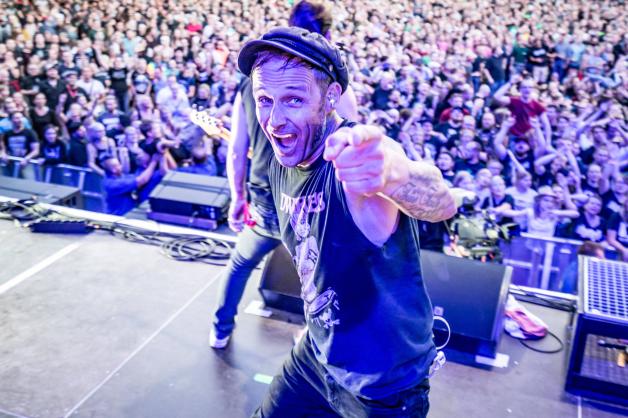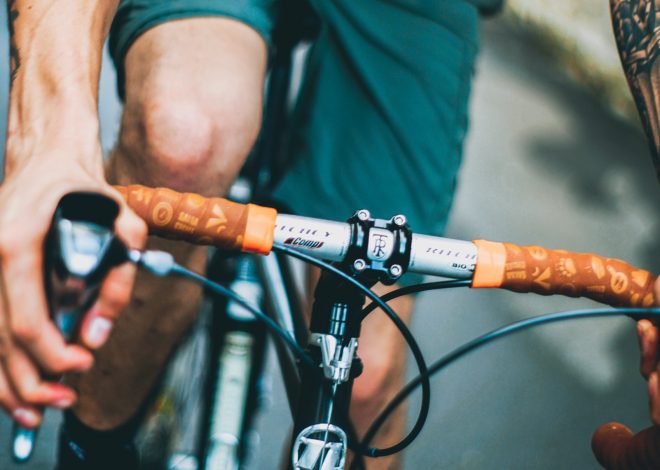
Singer Ingo Knollmann on humor and mental health
Mr. Knollmann, your band Donots is more popular than ever. Is this mainstream success even still punk?
That absolutely fits. It’s actually the punkiest thing that could have happened in the charts at that time. Because we do everything DIY (editor’s note). We are our own record company, we have our own studio, we do our own management, we have our own ideas – we did it all ourselves from scratch. The only thing that comes in from outside is Warner as a distributor who puts the records in the record stores around the world. In the week when we went to number one in the charts, there were big record companies in places two to six who burned up to 500,000 euros to get to the top if possible. And in the end we still sold over 50 percent more records than second place. That was the moment when we thought: Yes, you can achieve something straight away. And how punk is that? To generate a critical mass of people who still buy records. Just like that!
Knollmann’s band relies on humor
Given your current popularity, what is the Donots’ recipe for success?
Like marathon runners, we just kept at it. And we have always remained very authentic in what we do. We have found a nice constellation in which the five of us are still creative. We don’t copy ourselves all the time or follow a shadow of ourselves. We also found great fun in approaching every concert in a free-spirited way. We love creating strange moments. Strange in the sense of memorable. We stay on our feet and that’s the big recipe. That’s the essence. Our sense of humor and the attitude of not taking ourselves too seriously are the most important building blocks. If we had a Powerpoint presentation saying how we plan for the next five years, it wouldn’t work. But that shouldn’t be the case. Then you quickly become one of those typical mainstream German pop rock bands that once have a hit that disappears just as quickly as the fans.
He tries to make every performance a special experience for his audience, says Ingo Knollmann.
Photo: Andre Havergo

Looking back now at your band’s history, is there anything that’s the same as before?
Our humor. I think this is a total elixir of life. When you’re on the road for so long and you’re so close to each other for three decades, you can tell each other anything. That we take our music and what we do very seriously, but not ourselves at all. This is super important. There are no egos with us in any way. The humor has tended to be no worse than it used to be. Except that now we’re the only ones laughing about it.
Knollmann about music and political commitment
Their band name is derived from the English “Do nothing”. How does this fit in with the band’s political commitment today?
You’re right. Overall, we contradict the name a lot because we do a lot. Just as important as knowing what you want is knowing what you don’t want. Then the band name makes sense because we clearly differentiate ourselves from certain things. It’s always most important to know what you don’t want.
And what don’t you want?
I’m not in the mood for small-mindedness or backwardness. On traditions for their own sake. Everything is welcome to be put to the test so that society can become as good as possible. That’s why I don’t have a problem with gender, for example. I don’t think anything will break out of my crown if I do that. But I help the visibility of certain people. These are all small but important adjustment screws. In other words: If everyone walked around with the credo: “Don’t be an asshole,” then it would be a lot easier. It can be that simple, but it is also that difficult. But I’m trying to use the opportunities we have to make the world a little bit better – if only for a few minutes. That can’t be asking too much.
So what’s your tip for not being, as you say, an “asshole”?
I think this is super easy. Every person has a certain idea of how he or she would like to be treated – in terms of communication within their own circles or simply the open arms with which they prefer to be welcomed. Anyone who adopts this as a moral compass behaves better: So you don’t want to be treated as an asshole? Then please don’t treat anyone else as an asshole. Think about what you really need and where you are stepping on people’s toes – or living beings. I have been a vegetarian for over 30 years. This is a super important topic. So be as respectful to all living beings as you will hopefully be treated. And use a mixture of fear and beer (laughs)!
And do you think that all bands have a political or social responsibility?
I don’t think it necessarily has to take place on stage, entertainment is entertainment. Music has many different faces and forms of expression. This means that there can be a concert that is simply completely gaga or that doesn’t deal with politics in songs at all. This is completely right. But I find it extremely dangerous when people don’t express themselves away from the stage. This is something I really complain about because everyone should be aware of the responsibility. Even more so if it has a certain reach and can reach people. I think it would be negligent not to position yourself there. And that to me is a classic, ignorant asshole mentality. That doesn’t work.
Donots singer Ingo Knollmann and his bandmates have been on stage for 30 years – and it’s getting funnier, says Knollmann.
Photo: Andre Havergo

Ingo Knollmann: More mental health, less perfectionism
If you could send a message back in time, what advice would you give your 16-year-old self?
Stop forming bands! That’s a really bad idea (laughs). No, if I were to advise him something, I would say: take it easy sometimes and try not to be quite so perfectionistic. That’s something that has consumed me a bit in this band. When I do things, I would like to do them at 200 percent and actually 80 or 90 percent is always enough. But I can’t tell myself that. I often spent a lot of energy trying to achieve things were unnecessary in detail. So: Be less perfectionist. Let yourself fall back a little more. You can’t control everything.
And do you still have perfectionism now?
I still have some of it. But I now know that not all of that is necessary. I used to really say to everything that had to do with the band, to every offer we got: Sure, let’s go! Of course here’s another interview, of course about the radio, then about television. Nowadays we pick out the nice things and know that the masses don’t do it. Nobody buys a record anymore just because you gave two more interviews. I pay more attention to making sure things work out for our families. Your own well-being depends largely on saying “no” sometimes.
They toured despite mental health issues and resulting panic attacks that began in 2001. How did you survive being on stage knowing you were about to have a panic attack?
The crazy thing is that this is simultaneously the greatest fear, but also the great cure. I’ve always tried to trust that it’ll work on stage – it has to work. If I didn’t have that anymore, then I would have lost my elixir of life. That’s why I’m happy about talk therapists who say: If you’re afraid, go into the fear, don’t avoid it. Put yourself in these situations to find out that you are afraid of fear, but that not much can happen. I threw myself headfirst into it – and then it worked. And at some point you will gain confidence. Then you suddenly realize: My fears were unfounded.
What are you still doing for your mental health today?
Same indeed. I try to actively put myself into such situations. For example, I still don’t like flying. But I don’t see the point of letting any nail in my head dictate where I go. So I get on a plane anyway. Then I might not be able to sleep, but I know that when I get to the airport it will be totally cool. It’s worth it and that’s why I continue to try to tackle challenges courageously and overcome fears.

Ethel Purdy – Medical Blogger & Pharmacist
Bridging the world of wellness and science, Ethel Purdy is a professional voice in healthcare with a passion for sharing knowledge. At 36, she stands at the confluence of medical expertise and the written word, holding a pharmacy degree acquired under the rigorous education systems of Germany and Estonia.
Her pursuit of medicine was fueled by a desire to understand the intricacies of human health and to contribute to the community’s understanding of it. Transitioning seamlessly into the realm of blogging, Ethel has found a platform to demystify complex medical concepts for the everyday reader.
Ethel’s commitment to the world of medicine extends beyond her professional life into a personal commitment to health and wellness. Her hobbies reflect this dedication, often involving research on the latest medical advances, participating in wellness communities, and exploring the vast and varied dimensions of health.
Join Ethel as she distills her pharmaceutical knowledge into accessible wisdom, fostering an environment where science meets lifestyle and everyone is invited to learn. Whether you’re looking for insights into the latest health trends or trustworthy medical advice, Ethel’s blog is your gateway to the nexus of healthcare and daily living.



